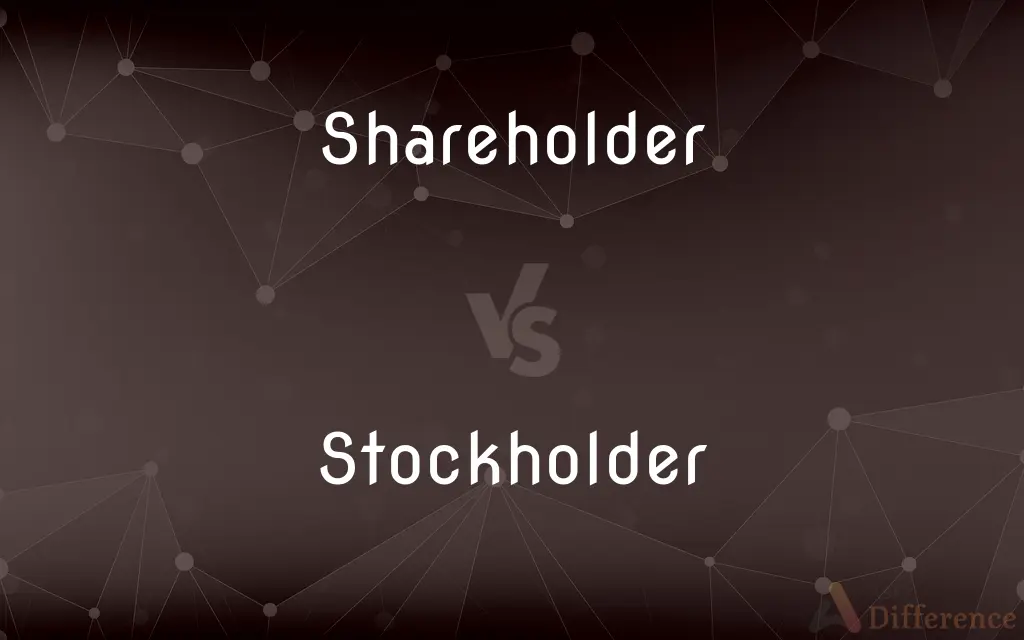Shareholder vs. Stockholder — What's the Difference?
Edited by Tayyaba Rehman — By Maham Liaqat — Updated on April 4, 2024
A shareholder is an entity that owns shares in a company, while a stockholder specifically owns stock shares, highlighting a more traditional term in U.S. corporate context.

Difference Between Shareholder and Stockholder
Table of Contents
ADVERTISEMENT
Key Differences
Shareholders are broadly recognized as individuals or entities that own at least one share of a company's stock, giving them a stake in the company's equity. This ownership grants them certain rights, such as voting on corporate matters. On the other hand, stockholders are often used interchangeably with shareholders but traditionally refer to those owning stock in corporations, emphasizing their role in stock-based ownership and investment.
While all stockholders are shareholders, the term "shareholder" can also apply to owners of different types of shares, such as preferred or common shares, which come with different rights and benefits. Stockholders, whereas, are typically associated with common stock ownership, focusing on the equity aspect of their investment in a company.
Shareholders have the right to receive dividends, vote at shareholder meetings, and share in the assets of the company during liquidation. Stockholders, while also entitled to these rights, are specifically linked to the stock market's dynamics, reflecting their investment's performance more directly in stock value changes.
The significance of being a shareholder lies in the potential for profit and influence within the company. Meanwhile, being a stockholder underscores participation in the broader stock market, highlighting the investment's liquidity and market-driven valuations.
Terms like "shareholder" and "stockholder" signify an individual's or entity's engagement with corporate governance and financial performance. While the terms are often used interchangeably, the context of "stockholder" can sometimes provide a nuanced emphasis on stock market activity.
ADVERTISEMENT
Comparison Chart
Definition
An individual or entity that owns shares in a company.
An individual or entity that owns stock in a corporation.
Types of Shares
Can own common, preferred, or other types of shares.
Typically refers to owners of common stock.
Rights
Voting rights, dividends, and liquidation shares.
Voting rights, dividends, and liquidation shares.
Emphasis
Broadly focuses on equity ownership in a company.
Traditionally emphasizes participation in the stock market.
Applicability
Universal in describing ownership in both public and private companies.
Often used in the context of public companies and stock market investment.
Compare with Definitions
Shareholder
Entitled to dividends if the company decides to distribute profits.
The company announced a dividend payout to all shareholders.
Stockholder
Benefits from the sale of assets if the company is dissolved.
Stockholders were the last to receive any remaining assets.
Shareholder
An entity that holds an ownership stake in a company through shares.
As a shareholder, she voted in the annual meeting.
Stockholder
Receives dividends based on company performance and decisions.
Stockholders received a higher dividend than last year.
Shareholder
Has a claim on company assets upon liquidation.
Shareholders were compensated after the company was liquidated.
Stockholder
Holds common stock, typically, and participates in shareholder meetings.
The annual stockholders' meeting discussed future strategies.
Shareholder
Can participate in company decisions to a certain extent.
Shareholders approved the merger.
Stockholder
An individual or company that owns shares of stock in a corporation.
Stockholders saw an increase in their stock value this quarter.
Shareholder
May own various types of shares, including common or preferred.
He is a preferred shareholder, receiving dividends before common shareholders.
Stockholder
Specifically associated with the buying and selling of stocks in the market.
As a stockholder, he closely monitors the stock market trends.
Shareholder
A shareholder (also known as stockholder) is an individual or institution (including a corporation) that legally owns one or more shares of the share capital of a public or private corporation. Shareholders may be referred to as members of a corporation.
Stockholder
One who owns a share or shares of stock in a company. Also called stockowner.
Shareholder
One that owns a share or shares of a company or investment fund. Also called shareowner.
Stockholder
(finance) One who owns stock.
Shareholder
One who owns shares of stock in a corporation.
Shareholders are the real owners of a publicly traded business, but management runs it.
Stockholder
A company that maintains a stock of certain products.
XX are stockholders of round bar, flat bar and plate.
Shareholder
One who holds or owns a share or shares in a joint fund or property.
Stockholder
One who is a holder or proprietor of stock in the public funds, or in the funds of a bank or other stock company.
Shareholder
Someone who holds shares of stock in a corporation
Stockholder
Someone who holds shares of stock in a corporation
Common Curiosities
What distinguishes a stockholder from a shareholder?
The distinction is mostly semantic; "stockholder" is traditionally used in the context of owning stock in public companies.
Can someone be a shareholder without owning stock?
Generally, being a shareholder implies owning stock or shares; the terms are synonymous in most contexts.
What happens to shareholders if a company goes bankrupt?
Shareholders may lose their investment, as they are last in line to be compensated after debts are paid.
What is the difference between a majority and a minority shareholder?
Majority shareholders own more than half of a company's shares, giving them significant control, while minority shareholders own less.
What rights do shareholders have?
Shareholders have rights to dividends, voting at meetings, and a share in assets upon liquidation.
Is it better to be a shareholder or a stockholder?
The terms are largely interchangeable; the benefits depend on the type of shares owned and the company's performance.
How do shareholders make money?
Through dividends and selling shares at a higher price than they were purchased.
How often do shareholders vote?
Typically, once a year at the annual general meeting, though special meetings can also be called.
Are all stockholders shareholders?
Yes, all stockholders are considered shareholders, but the term "shareholder" has a broader application.
Do shareholders have a say in company operations?
Shareholders can vote on major decisions but do not manage day-to-day operations.
What is a shareholder meeting?
A gathering where shareholders vote on company matters and board member elections.
Can a shareholder sell their shares at any time?
In public companies, yes, shares can be sold on the stock market; in private companies, sale conditions may vary.
Are shareholders responsible for company debts?
Shareholders' liability is limited to their investment; they are not personally responsible for company debts.
Can anyone become a shareholder?
Yes, by purchasing shares of a company's stock, anyone can become a shareholder.
Do all shareholders get dividends?
Not necessarily; it depends on the type of shares owned and the company's dividend policy.
Share Your Discovery

Previous Comparison
Prerequisite vs. Requirement
Next Comparison
Amphiprotic vs. AmphotericAuthor Spotlight
Written by
Maham LiaqatEdited by
Tayyaba RehmanTayyaba Rehman is a distinguished writer, currently serving as a primary contributor to askdifference.com. As a researcher in semantics and etymology, Tayyaba's passion for the complexity of languages and their distinctions has found a perfect home on the platform. Tayyaba delves into the intricacies of language, distinguishing between commonly confused words and phrases, thereby providing clarity for readers worldwide.
















































